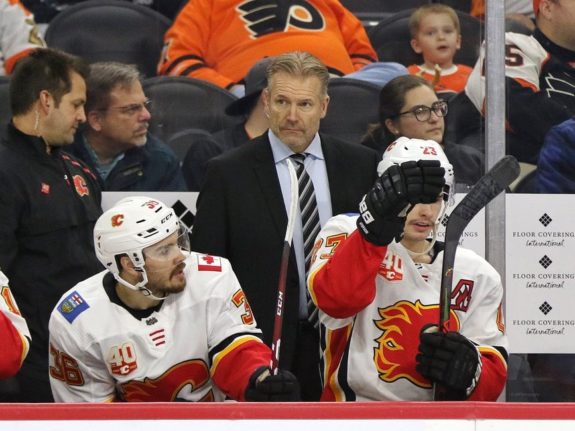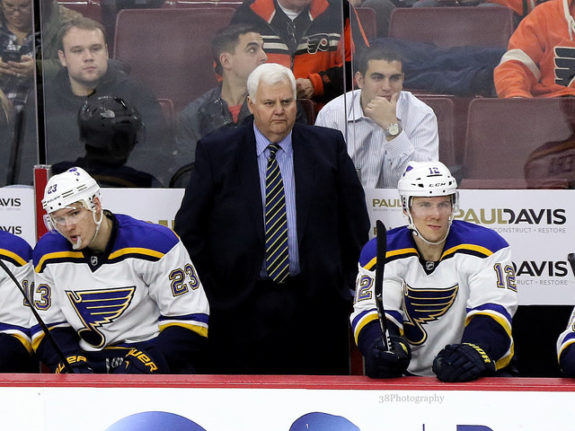Nearly two years ago, I wrote a piece regarding the Calgary Flames and their alleged lack of “character”. The conclusion I drew back then: conversations about a team’s character are essentially meaningless because there’s no consensus among fans, reporters, players and team executives on what the word “character” actually means.
I still stand by that conclusion, and it has been proven right many times since.
Following the Flames’ loss on Feb. 6 to the Nashville Predators, their third consecutive loss in a tight playoff race, interim head coach Geoff Ward fielded a question in the post-game press conference about the team’s identity. The exchange went as follows:
Q: What do you think the identity of this team is right now?
A: I think we’ve got to find it. I thought we had it for a while. We’ve got to find it again. We tried to be a scoring team last year, and you saw what happened at playoff time. We’ve got to check in now and make sure we get back to our identity because we’re not there.
Funny how he answered the question without stating what their identity used to be, when they “had it for a while.”
Based on this comment, and the discussion among fans on social media that followed, it’s clear the same problem exists for the word “identity” as the word “character”. People say things like “this team doesn’t have an identity” or “this team is beginning to find its identity” almost casually, as though there’s some kind of consensus on what that actually means. There isn’t.
Conversations about team identity are weird, tricky, and usually vague. If you don’t think so, try this exercise:
Think of a team that, in your opinion, does have an identity. Then ask yourself why you picked them, come up with a few concrete reasons. Try to summarize what that team’s identity actually is. It may be tougher than you think.

I don’t want to get all philosophical on you, nor do I want to split hairs on terminology. But the words we use are important, and debates never get settled until people agree on what words actually mean.
Having looked more closely at the way hockey people (including fans, players, coaches, and journalists) use the word “identity”, I believe it can mean one of three things.
Roster Build
It’s not uncommon to see hockey people use the term “identity” and “roster build” almost interchangeably. A team can distinguish its identity by finding players with similar attributes and playing them together.
One team can be known as “young and talented” while another is built on “veterans and experience.” You can gain a reputation as “fast and skilled” or “big and physical.” The team identity stems from the players on the ice.
If you subscribe to this definition, then a good example of a team that has an identity would be the Toronto Maple Leafs. Say what you want about general manager Kyle Dubas, but he has not been shy or indecisive about what kind of team he is trying to build, i.e. what he wants their identity to be. He’s going with speed and skill all the way.

Two days before the Maple Leafs fired Mike Babcock, when the team was on the tail-end of an inexplicable spell of bad play, Sportsnet’s Jeff Blair wrote the following:
“Identity? The GM has clearly said they are going to overdose on skill at the expense of physical play. There’s your identity.”
Notice that having a distinct team identity, by this definition, doesn’t necessarily translate into team success. If identity is the same thing as a distinctive or unique roster build, then the Maple Leafs have an identity. And yet they currently sit on the fringe of the playoff picture and have not won a playoff round in many years, in spite of all that talent.
Some teams aren’t really famous for emphasizing any one attribute on their roster. They’re not particularly young or experienced, speedy or physical. These would be the teams without an identity, the ones you look at and say: What are you?
Systems or Playing Style
This is another common use of the term “identity”: trying to define what style a team consistently plays.
Some teams are known for their responsible defensive play and for winning those low-scoring games. Other teams have a reputation for their offensive, run-and-gun style, scoring their problems away. Maybe your team’s not famous for playing smart and out-thinking opponents, maybe they just win by being difficult to play against and out-working them. That by itself can be considered an identity.
Dimitri Filipovic wrote the following on ESPN about the Columbus Blue Jackets:
“The best thing this team has going for it is an established identity: This is an incredibly difficult team to play against. The Blue Jackets are tenacious, they’re relentless, and they don’t give you time to take your foot off the pedal and relax.”
By this definition, a team’s identity is usually closely linked to its coach. How many times did we hear about former head coach Ken Hitchcock’s teams being known for their defence-first identity? How many times did we hear the Maple Leafs were looking “reshape their identity” after making the transition from head coach Mike Babcock to Sheldon Keefe? (from “The Leafs are changing under Sheldon Keefe — and even they can see the beauty of it” The Star, 11/12/2019)

If a coach can teach a system of play that works, and the players can buy in enough to make it successful consistently, then you might say that team has started to form an identity. A good example of this would be the 2018-19 New York Islanders.
They went from worst to first in terms of team defence in a single season. They were known for their style of defensive play that kept shots to the outside and allowed almost zero high-danger chances in front of the net. Because their roster didn’t have a lot of household names, most of the credit was given to head coach Barry Trotz and his systems.
Team Direction or Plan
Team identity can also be closely connected to the decisions made at the very top: general managers, front offices, even team owners. The tough decisions that determine where the team will be next season, three years from now, those could be considered part of a team’s identity.
A rebuilding team, a Cup contender, a team on the bubble; each of these could be considered an identity. And many fans and journalists use the term that way. Teams with “no identity” are the ones that are not self-aware enough to assess what they are.
If having a plan or a direction for the team is what it means to have an identity, then a good example of a team without an identity would be the Minnesota Wild for the past five years or so. Never a Cup contender, never fully committing to a rebuild, never really giving any sign of where they are headed next.

A good example of a team with an identity would be the 2017-18 New York Rangers. They penned an open letter to fans, candidly acknowledging what they were: a rebuilding team. Big sellers at the trade deadline. They presented a direction, a long-term plan for the team, saying in no uncertain terms “this is who we are.” Nobody questioned their identity after that.
Circling back to the Flames and Geoff Ward’s press conference, Calgary appears to be another team searching for an identity. The In The Dome podcast gave the following assessment of the Flames’ identity and General Manager Brad Treliving’s role in creating it.
“If Treliving has a plan, I don’t see it.”
Episode: Is There a Method to Tre’s ‘Bad’ness? Feb. 3, 2020
“It seemed like he did have a plan, going into last year. […] Then you have last year, an anomaly. Now you’re like: who are we? Everybody thought the Flames were better than they actually were. The reason why is because they finished first in the West.”
“How do you properly assess the team after the season they had last year? I think last year messed with the Flames’ identity.”
All of that is true. The 2018-19 season did unexpectedly alter the Flames’ direction, their long-term plan, in a big way. But it’s interesting to see the team’s “plan” used synonymously with its “identity.”
You may have noticed a pattern here: The first definition places most of the responsibility for team identity on the players. The second on the coaches, and the third on the GMs and ownership. Who is really responsible for forming a team’s identity? It depends on which definition of “identity” you subscribe to.
Changing the Conversation on Identity
Our brains like to divide things into two neat groups. In this case, it’s easy to just say that good teams have an identity, and bad teams don’t. The problem is it’s also lazy and factually wrong.

In a certain sense, teams like 2017-18 Rangers (who had a clear direction), the 2018-19 Islanders (who had a strong system) and the 2019-20 Maple Leafs (who have a distinct roster build) have some of the clearest and concrete team identities. Yet, they are not necessarily considered the “best” teams in the league, so far as I am aware.
So whether it’s a head coach behind a pulpit, a fan on Twitter, or an analyst trying to drive a point home on a podcast, the next time you hear someone say a team needs to “find its identity”, stop and think. What are they really talking about here? What definition of “identity” are they using?
Because until we can form some kind of consensus on what “identity” really means, there’s no point debating who’s got it and who doesn’t. We might as well remove it from our vocabulary. Yes, that includes you, Geoff Ward.